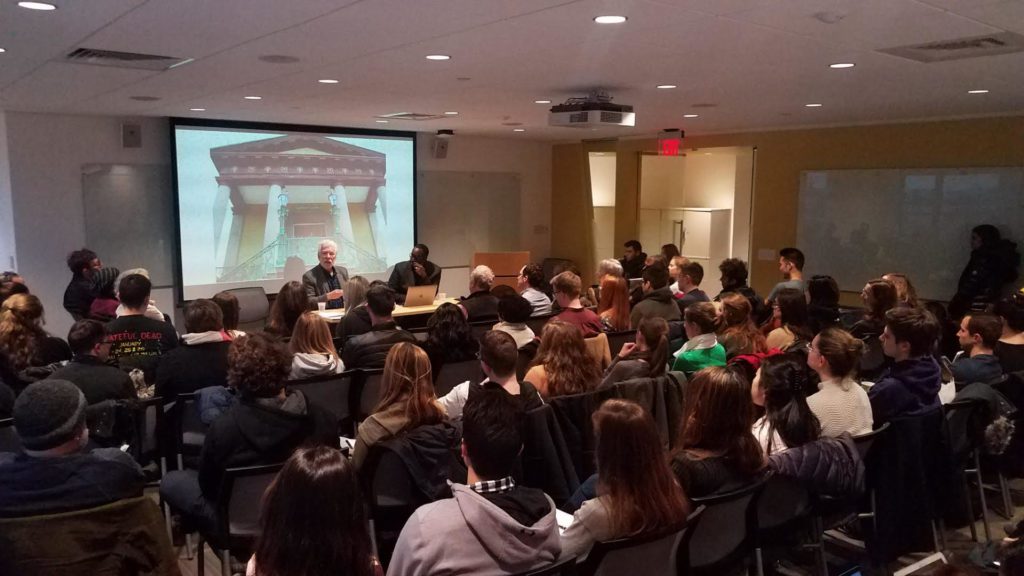By Hanyu Chwe
Earlier this month, podcast hosts Jack Hitt and Chenjerai Kumanyika came to Northeastern to discuss their Peabody-award winning podcast, “Uncivil” and share stories from the world of podcast historical journalism in a talk titled: “Punching History in the Face: how podcast journalism is challenging the dominant narrative of America’s past.”

Growing up in his hometown of Charleston, South Carolina, Jack Hitt couldn’t avoid Civil War history. He never thought that he would join Chenjerai Kumanyika, a professor of journalism and media studies at Rutgers, to create a new Civil War podcast that would “ransack America’s past.” Both men were tired of Civil War stories about famous battles and valiant charges on horseback. Instead, they envisioned their project as a tool of political action. By telling stories about the Civil War, “Uncivil” uses historical facts to fight against historical obfuscation. Especially with white supremacy in recent headlines, Kumanyika and Hitt’s podcast is resonating with listeners and fighting for a better history.
“Uncivil’s” pilot episode, “The Raid,” won a Peabody award for its retelling of the Combahee River Raid. In the episode, the story of Shedrick Manego—or Pa Shed to his family—is told by Pa Shed’s great-great-granddaughter. Pa Shed escaped from a South Carolina plantation only to enlist in one of the first African-American regiments in the Union Army, joined James Montgomery and Harriet Tubman, burned eight plantations, and helped free more than 700 slaves. Despite the dramatic nature of the raid, this saga from Civil War history isn’t well known today. In episodes like this one, Hitt and Kumanyika want to tell stories that feature black heroism and agency, stories that might have slipped through the cracks.
In their presentation, Kumanyika and Hitt explained several key factors driving the creation of “Uncivil.” Both hosts strongly emphasized the power of personal narratives. Many episodes of “Uncivil” feature the protagonists’ modern descendants. For example, the episode titled “The Ring” tells the story of Mary Bowser and Elizabeth Van Lew, a former slave and her former owner who collaborated to smuggle Confederate battle plans to the Union. Their spycraft escapades are told by Dionne Bowser Richardson and Sarah Grant, descendants of both women. Allowing relatives to narrate their ancestors’ stories adds a level of intimacy that’s hard to replicate outside podcast journalism.
Because “Uncivil’s” stories are told through audio, they can take a slightly different slant than more conventional historical re-tellings. Audio lets Hitt and Kumanyika resist traditional Civil War iconography. Instead of overlaying banjo and violin music over sepia-tinged photographs, they rely on the listener’s imagination to portray scenery. The soundtrack features gullah-style choirs, neo-soul, and hip hop. As Kumanyika said in the talk, “radio has the best pictures.”
Also, Kumanyika reminded us that traditional journalism narratives, whether in audio or in written text, risk depoliticization. That is, journalism usually tells personal stories as a way of uncovering larger truths. However, person-level approaches can conceal the structural nature of racism in the United States, instead portraying racism as a problem stemming from individuals and attitudes. The producers have to tell compelling personal narratives while also highlighting the political reality of racism in the Civil War and today.
Accordingly, even though it is important to consider a wide variety of historical perspectives, Kumanyika feels that it’s more important to ground history in objective fact. After Reconstruction, many American historians clouded important truths about the Civil War to glorify the Confederate cause. As a result, part of “Uncivil’s” mission is rectifying widespread Civil War misinformation. That mission requires a dedication to objectivity, and “Uncivil” decidedly pursues an objective, fact-based approach towards historical journalism.
Despite the brutal nature of the Civil War, Kumanyika and Hitt ultimately feel that “Uncivil” offers a strong message of hope. “Uncivil” shows that black people weren’t just sitting around during the Civil War; they were escaping plantations, leading military raids, and spying on Confederate generals. In the end, “Uncivil” tells us that, despite the political environment, ordinary people have tremendous power to help themselves and others.



